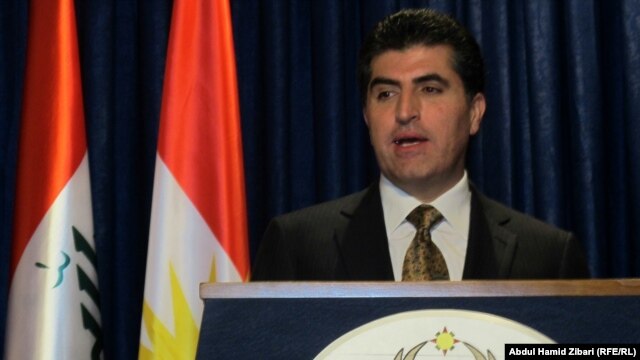Political crisis escalates in Iraq's Kurdistan region
| Publisher | Radio Free Europe/Radio Liberty |
| Publication Date | 13 October 2015 |
| Cite as | Radio Free Europe/Radio Liberty, Political crisis escalates in Iraq's Kurdistan region, 13 October 2015, available at: https://www.refworld.org/docid/56813c5415.html [accessed 5 June 2023] |
| Disclaimer | This is not a UNHCR publication. UNHCR is not responsible for, nor does it necessarily endorse, its content. Any views expressed are solely those of the author or publisher and do not necessarily reflect those of UNHCR, the United Nations or its Member States. |
Last updated (GMT/UTC): 13.10.2015 05:23
By RFE/RL
 Kurdish Prime Minister Nechirvan Barzani
Kurdish Prime Minister Nechirvan Barzani
The prime minister of Iraq's Kurdish region has fired four cabinet ministers and barred the speaker of parliament from entering the capital in an escalating political crisis that threatens to destabilize the region.
The parliament speaker and ministers are all members of the Gorran party, which the dominant Kurdistan Democratic Party (KDP) accuses of orchestrating violent protests that resulted in at least four deaths over the weekend.
The unrest is the worst the relatively peaceful autonomous region has seen in years and could undermine its effectiveness in the war against Islamic State militants, in which it is a key ally of the United States.
To "contain the situation," Prime Minister Nechirvan Barzani called in the ministers of religious affairs, finance, trade, and Peshmerga forces and "asked them to leave their posts," Kurdistan Regional Government spokesman Safeen Dizayee said.
He said the prime minister, who is a leader of the KDP, will designate existing members of the cabinet to fill the now-vacant posts on a temporary basis.
Earlier, parliament speaker Yousif Mohammed said security forces loyal to the KDP had turned him back on the road to Irbil, the capital of Iraq's Kurdistan region, where the parliament is located. He described the act as a "coup."
"Everything that happened today and yesterday is a dangerous development for the political process in Kurdistan," Mohammed said upon his return to the city of Sulaimaniyah, where Gorran is headquartered.
Relations between the parties that make up the government have come under increasing strain over the presidency of Masud Barzani, whose mandate expired on August 20.
Barzani wants to stay on, arguing his leadership is required to steer the region as its Peshmerga forces play a significant role in battling IS.
Gorran is one of four parties demanding a reduction of the president's powers as a condition for extending his term, but the KDP, which is led by Barzani, has resisted.
The stalemate has compounded an economic crisis that sent people into the streets in protest. The demonstrations turned violent last week with protesters attacking and torching several KDP offices across Sulaimaniyah Province.
The crisis is reinforcing old divisions in the region, which used to have two separate administrations, one based in Irbil and the other in Sulaimaniyah.
The KDP has vacated some of its offices in Sulaimaniyah in recent days and shut down offices of Gorran's TV channel KNN in the cities of Irbil and Duhok.
The offices of Sulaymaniyah-based Kurdish media network NRT were also raided by KDP security services who forced its staff out of Irbil Province over the weekend. But on October 12, the channel said it had been given permission to reopen.
With reporting by AFP and Reuters
Link to original story on RFE/RL website
